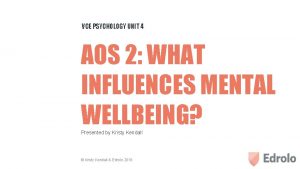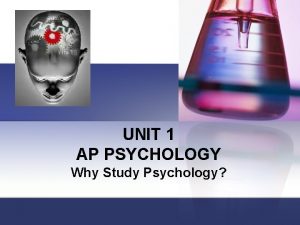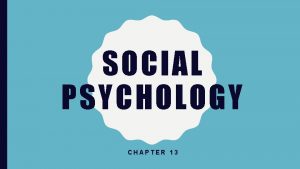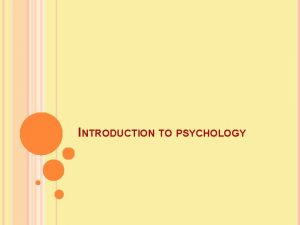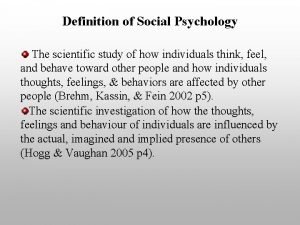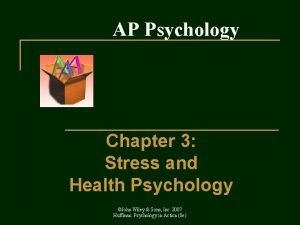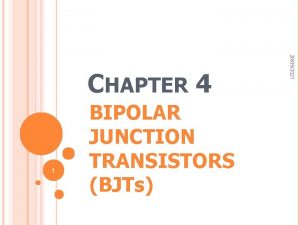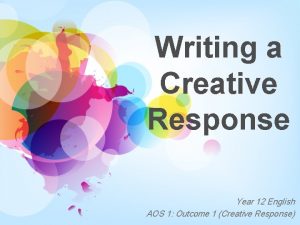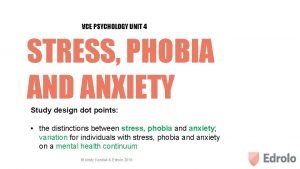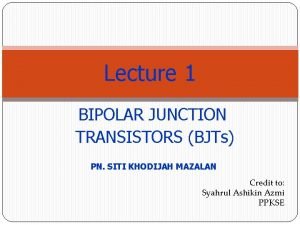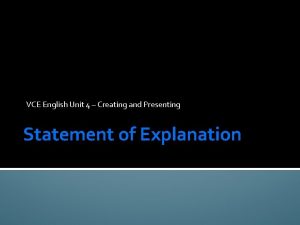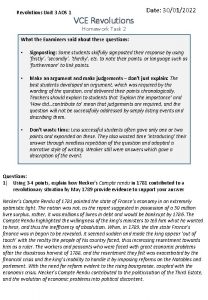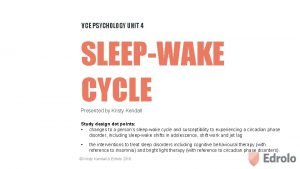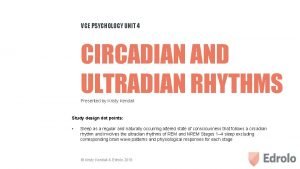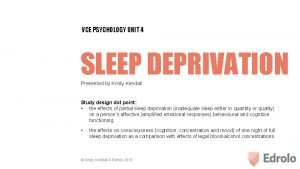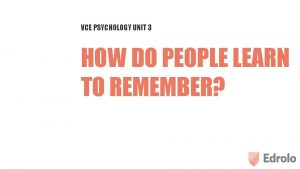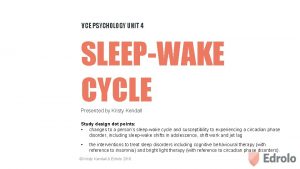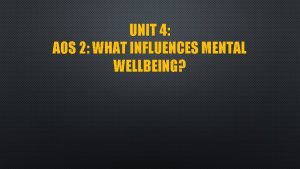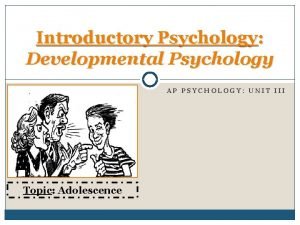VCE PSYCHOLOGY UNIT 4 AOS 2 WHAT INFLUENCES


























































- Slides: 58

VCE PSYCHOLOGY UNIT 4 AOS 2: WHAT INFLUENCES MENTAL WELLBEING? Presented by Kristy Kendall © Kristy Kendall & Edrolo 2016

AOS 2 Overview • Mental health continuum • Ethics • Risk factors • Stress, phobia and anxiety • Resilience • Behaviour change Images used under license from Pixabay © Kristy Kendall & Edrolo 2016

VCE PSYCHOLOGY UNIT 4 MENTAL HEALTH AS A CONTINUUM Presented by Kristy Kendall Study design dot points: • mental health as a continuum (mentally healthy, mental health problems, mental disorders) influenced by internal and external factors that can fluctuate over time • the typical characteristics of a mentally healthy person, including high levels of functioning, social and emotional well-being and resilience to life stressors © Kristy Kendall & Edrolo 2016

© Kristy Kendall & Edrolo 2016

Wood engraving by E. Tritschler, 1908. Image used under license from en. wikipedia. org © Kristy Kendall & Edrolo 2016

Defining mental health and disorder • In 1952, the American Psychiatric Association introduced the term ‘mental • disorder’ to its DSM. • A mental disorder is a clinically significant behavioural or psychological syndrome or • pattern that occurs in an individual and that is associated with present distress (e. g. a • painful symptom) or disability (i. e. impairment in one or more aspects of functioning) or • with a significantly increased risk of suffering, death, pain, disability or an important loss • of freedom. • American Psychiatric Association, 2000 © Kristy Kendall & Edrolo 2016

Mental health continuum MENTALLY HEALTHY • According to the World Health Organization (1998), mental health is a state of emotional and social wellbeing in which individuals realize their own abilities, can cope with the normal stresses of life, work productively and contribute to their community. MENTAL HEALTH PROBLEMS • Most of the time people with mental health problems are mentally healthy – but the normal stresses and strains of life can lead to temporary and minor setbacks. This may be related to the strain of a change in family situation, relationship breakdown or impending examinations. Such situations may cause difficulty with the person’s thought processes, emotional stability, concentration, behavior and perceptions. • These issues may interfere with normal daily functioning, but for a limited time. Most mental health problems are simply exaggerated forms of normal thoughts, feelings and behaviors. We can all feel happier or more miserable from one day to the next and normally we are resilient enough to bounce back. © Kristy Kendall & Edrolo 2016

MENTAL DISORDERS • Mental disorders are more serious, often longer lasting conditions than mental health problems. The term implies a clinically recognisable set of symptoms and behaviors that usually need treatment to be alleviated. • About 20– 30 per cent of people in Australia will experience a mental disorder at some stage in their lives. Some mental disorders are more likely to occur early in life, others much later and a few may occur either early or later in life. • The nature and course of a mental disorder may vary from person to person. Many people have only one, short-lived episode and fully recover. Others battle their whole life with a mental disorder. With psychological and often medical support, the vast majority of people living with mental disorder can lead full, active an successful lives. © Kristy Kendall & Edrolo 2016

Mental health continuum © Kristy Kendall & Edrolo 2016

Internal and external factors influencing mental health • Today, the central tool for mental health practitioners is the ‘biopsychosocial model’ (Engel, 1977). • According to this model, mental health is influenced by the interaction of internal (biological and psychological) and external (sociocultural)factors. © Kristy Kendall & Edrolo 2016

• Factors that influence mental health and our ability to respond to our environment may include: > current life stressors such as problems at work, at school or with relationships > drug and/or alcohol abuse > dramatic changes in hormone levels – such as during pregnancy or adolescence > trauma/loss > social isolation. • The effects of these internal and external factors can fluctuate over the lifespan as a result of hereditary, social or environmental factors. • The types of stressors we come across as well as the way we respond to them will change. © Kristy Kendall & Edrolo 2016

EG a person may have good mental health in childhood and adolescence, but then experience the onset of a mental disorder as they encounter new pressures at work or in relationships. Our mental health may improve with age as environmental stressors diminish or as we develop coping mechanisms. Mental disorders may also develop in old age, with one in five dementia sufferers also experiencing depression. © Kristy Kendall & Edrolo 2016

Diagnosis of mental disorder • A correct diagnosis is extremely important as it can assist with the course of treatment and the control. One of the roles of a psychologist is to diagnose mental disorder. • The two principal tools for naming a mental disorder are the International Classification of Diseases (ICD) and the DSM, Diagnostic and Statistical Manual of Mental Disorders • DSM is the most widely used diagnostic manual in Australia. • A correct diagnosis is extremely important as it can assist with the course of treatment and the control • Diagnosis is based on a number of factors, including - the person’s medical condition, - psychosocial stressors, - extent to which their mental state is interfering with everyday life. • The number of disorders has increased as the different revisions of the DSM have been published from 106 in 1952 and now stands at 380 -plus. © Kristy Kendall & Edrolo 2016

Mental health professionals rate an individual on the extent to which they show personality characteristics such as the following: > neuroticism (with emotional stability as its opposite), which means a person is anxious, stressed, depressed and self-conscious > agreeableness (with self-interest and suspicion as its opposite), which means a person is compassionate and trusting > conscientiousness (laziness and carelessness as its opposite), which means that a person is self disciplined, and reliable. Other possible dimensions would be compulsiveness, antisocial responses and social withdrawal. © Kristy Kendall & Edrolo 2016

Characteristics of a mentally healthy person Mental health is a state of emotional and social well-being in which individuals can cope with the normal stresses of life, can work productively and can contribute to their community. 1. High level functioning - can live and work productively and can contribute to their community. 2. Social well-being - able to maintain positive social relationships 3. Emotional well-being – able to manage one’s emotions 4. Resilience - Resilience is the ability to adapt to adversity or stress The following are also important: • Environmental quality • Self management skills • Physical health Images used under license from en. wikimedia. org © Kristy Kendall & Edrolo 2016

Typical characteristics High levels of functioning independence, goals, development Social wellbeing connected, reciprocated, valued, desired Emotional wellbeing balanced, normal range, strategies Resilience the capacity to recover quickly from set backs Image used under license from Pixabay © Kristy Kendall & Edrolo 2016

• A mentally healthy person might display the following characteristics of emotional and social wellbeing: > normal mood fluctuations > calm state of mind/takes things in their stride > good sense of humor > performs well at school and work > good cognitive functioning > good level of concentration > normal sleep patterns > few sleep difficulties > physically well > good level of energy > physically and socially active > maintains positive relationships with family and others. © Kristy Kendall & Edrolo 2016

Some tips for mental wellbeing • Look after your physical health – diet, sleep & exercise • Be social – invest time in your connections and give to others • Do something you enjoy – hobbies, creative pursuits and learning • Have down time – time for self • Take notice – take action • Remember A-B-C: Act–Belong–Commit. Being active, having a sense of belonging and having a purpose in life all contribute to happiness and good mental health. Images used under license from Pixabay © Kristy Kendall & Edrolo 2016

Mental illness is a mental disorder that affects one or more functions of the mind. A mental illness can interfere with a person’s thoughts, emotions, perceptions and behaviours. • Mood disorders – depression, bi-polar • Anxiety disorders – OCD, phobias, panic disorder, post-traumatic stress disorder • Schizophrenia • Multiple-personality disorder • Borderline personality disorder © Kristy Kendall & Edrolo 2016

Mental illness • 1 in 5 adults each year in Australia • 15% of adolescents • Anxiety disorders the most common in women, while substance abuse disorders are most common in men • Age of onset varies for each disorder • Young people aged 18 -24 have the highest prevalence • Genetic or environmental inheritance • Fluctuations over time © Kristy Kendall & Edrolo 2016

Case study: Jani’s story Video source: https: //www. youtube. com/watch? v=UTUMt 05_n. CI Article source: http: //www. huffingtonpost. com/michael-schofield/january-first-child-withschizophrenia_b_1753687. html © Kristy Kendall & Edrolo 2016

Facts & myths Facts Myths Mental illness is more prevalent in Australia Mentally ill people are violent Hospital admissions are less than 1% Once you are a diagnosed with a mental disorder it is for life Source: http: //www. mindframe-media. info/for-media/reporting-mental-illness/facts-and-stats Images used under license from Freerange © Kristy Kendall & Edrolo 2016

Seeking help • The 1 in 5 study showed that less than half of those who reported mental illness sought treatment. . . . why? • Access • Education • Labelling • Stigma Images used under license from Freepik © Kristy Kendall & Edrolo 2016

Stigma is a sign of disgrace that sets someone apart from one another. Images used under license from Shutterstock © Kristy Kendall & Edrolo 2016

The Rosenhan experiment (1973) Video source: https: //www. youtube. com/watch? v=j 6 bm. Z 8 c. VB 4 o © Kristy Kendall & Edrolo 2016

Getting help © Kristy Kendall & Edrolo 2016 Free support services Contact Kids Helpline 1800 55 1800 www. kidshelpline. com. au Headspace 1800 650 890 www. eheadspace. org. au Beyond Blue 1300 22 4636 www. youthbeyondblue. com Lifeline Call 13 11 14 www. lifeline. org. au

Multiple choice activity From a psychological perspective, being mentally healthy is best described as A. the absence of a mental illness. B. being popular and having lots of friends C. rarely experiencing negative emotions, such as anger D. using one’s cognitive, emotional and social abilities effectively © Kristy Kendall & Edrolo 2016 (VCAA 2014 Exam Q 12)

Multiple choice response From a psychological perspective, being mentally healthy is best described as A. the absence of a mental illness. B. being popular and having lots of friends C. rarely experiencing negative emotions, such as anger D. using one’s cognitive, emotional and social abilities effectively © Kristy Kendall & Edrolo 2016 (VCAA 2014 Exam Q 12)

Fast five: Question 1 If someone is thought to have high levels of functioning and good social and emotional wellbeing they are thought to have good mental _______. © Kristy Kendall & Edrolo 2016

Question 1 (Response) If someone is thought to have high levels of functioning and good social and emotional wellbeing they are thought to have good mental _______. Answer: Health © Kristy Kendall & Edrolo 2016

Fast five: Question 2 The disruption of someone’s thoughts, emotions or behaviour can be sign of mental ______. © Kristy Kendall & Edrolo 2016

Question 2 (Response) The disruption of someone’s thoughts, emotions or behaviour can be sign of mental ______. Answer: Illness © Kristy Kendall & Edrolo 2016

Fast five: Question 3 The capacity to recover quickly from set backs is known as what? © Kristy Kendall & Edrolo 2016

Question 3 (Response) The capacity to recover quickly from set backs is known as what? Answer: Resilience © Kristy Kendall & Edrolo 2016

Fast five: Question 4 T/F: There is only one type of mental disorder. © Kristy Kendall & Edrolo 2016

Question 4 (Response) T/F: There is only one type of mental disorder. Answer: False © Kristy Kendall & Edrolo 2016

Question 5 (Response) What is it called when a sign of disgrace sets someone apart from others? Answer: Stigma © Kristy Kendall & Edrolo 2016

VCE PSYCHOLOGY UNIT 4 MENTAL HEALTH AND ETHICS Presented by Kristy Kendall Study design dot point: • ethical implications in the study of, and research into, mental health, including informed consent and use of placebo treatments. © Kristy Kendall & Edrolo 2016

© Kristy Kendall & Edrolo 2016

Studying mental health • Recent research: – Link between pre natal BPA and anxiety in boys – Psychosis linked to low levels of exercise – Mindfulness combats depression in disadvantaged black women – Chronic pain linked to partners of people with depression © Kristy Kendall & Edrolo 2016

Mental health in Australia • Cost to support mental illness is estimated at $28. 6 billion • Estimates are greater when investigating work place related costs and expenses. • Represents 13% of health concerns on Australia • Mental health research is vital, but there are many ethical considerations that contribute to the difficulty of performing rigorous, placebo-controlled experiments with human participants. • Two of the vital ethical considerations are informed consent and appropriate safeguards when using placebos. © Kristy Kendall & Edrolo 2016

Controlling variables • Placebo – A fake or false drug or treatment • Placebo effect – A change in participant behaviour due to expectation regarding the treatment they are receiving • Experimenter effect – A change in participant behaviour due to the experimenter’s treatment or influence Image used under license from YAYimages © Kristy Kendall & Edrolo 2016 Single blind study Participants are unaware of whether they are in the control/experimental group Double blind study Participants and researchers don’t know which group is control or experimental

Placebo treatments • The use of placebo treatments in mental health research is a cause for ethical debate, even though they are common in many research designs. • While placebos can make people feel better, the effect can be small or temporary when compared with a legitimate treatment. • An important part of research that involves participants is informed consent, and this cannot really be obtained when there is the deception involved in a placebo controlled research design. • Another problem with placebo treatments in research is that it can sometimes require a participant to go without treatment. • Imagine you have a mental disorder such as an anxiety disorder. You volunteer for a trial to test a new medication that is supposed to reduce your symptoms. You later find out that the medication you have been taking is a placebo. How do you feel about this? • In cases where a sound treatment for a mental disorder already exists, the use of a placebo treatment to trial a new treatment can be seen as unethical. This is because medical health professionals are required to provide patients with the best proven treatment available • However, there arguments in favour of using placebo treatments in trials, such as that the placebo effect can still improve patient symptoms and the outcome of the trials can often improve treatment methods overall. © Kristy Kendall & Edrolo 2016

Controlling variables Group A. © Kristy Kendall & Edrolo 2016 Group B.

The Hawthorne effect Women in the Relay Assembly Test Room, ca. 1930 Western Electric Company Hawthorne Studies Collection © 2007 President and Fellows of Harvard College; all rights reserved. Image source: http: //www. library. hbs. edu/hc/hawthorne/big/wehe_131. html © Kristy Kendall & Edrolo 2016

Big questions? • • Are there ethical implications with giving a placebo if – …. . we are replacing treatment – . . . . we have a negative impact on recovery – . . . . we create a new symptom An interesting article on the placebo effect: : http: //www. medicinenet. com/script/main/art. asp? articlekey=126041 Image used under license from Pixabay © Kristy Kendall & Edrolo 2016

Ethics Role of the Experimenter Rights of the Participant No psychological or physical harm Voluntary Participation Must be worthwhile Informed Consent Deception Confidentiality Debriefing Withdrawal Rights © Kristy Kendall & Edrolo 2016

Informed consent • Imagine you are a researcher and you wish to examine the effectiveness of a new therapy that you have designed to treat social anxiety disorder. You have randomly selected 100 volunteer adult participants, all diagnosed with social anxiety disorder. • You have randomly allocated 50 into the experimental group (E-Group) and 50 into the control group (C-Group). • The independent variable is simply going to be whether participants receive therapy (E-Group); or a counselling treatment (a placebo), which will not harm them at all, but is known to have no positive effects in the treatment of social anxiety disorder (C-Group). • Informed consent requires that participants are aware of the purpose of the research and know what will be expected of them as they participate. This means that the researchers must either tell participants whether they are in E-Group or C-group, or deceive them into believing that they are all receiving therapy! • Obviously, you would have to put your proposal in detail up before the ethics committee of the institution that was overseeing your research. If they felt that the research was of potentially great value, then you may receive permission to make such deception, provided you perform thorough debriefing and inform participants of how they can obtain counselling if required. • This dilemma is extremely common in research into mental health. © Kristy Kendall & Edrolo 2016

Ethics in mental health What extra care needs to be taken in regards to ethical considerations: • Confidentiality • Informed consent • Debriefing © Kristy Kendall & Edrolo 2016

Implications of research on mental health Do we need to flip this issue? Does research or experimentation itself have an impact on mental health? Check out the link to ‘ 10 Famous Psychological Experiments That Could Never Happen Today’ in further materials. Image used under license from Pixabay © Kristy Kendall & Edrolo 2016

Multiple choice activity If researchers deliberately deceive a research participant must take place? A. informed consent B. an inquiry C. a thorough debriefing D. data collection © Kristy Kendall & Edrolo 2016

Multiple choice activity John Watson classically conditioned the emotional response of fear in the 11 -month-old child ‘Little Albert’. With regard to current ethical standards, a major ethical concern regarding the ‘Little Albert’ research would be that: A. there was no control condition in the study. B. ‘Little Albert’ was too young to give informed consent. C. ‘Little Albert’ was deceived about the nature of the research. D. ‘Little Albert’ demonstrated severe distress and Watson made no attempt to end the experiment. © Kristy Kendall & Edrolo 2016 (VCAA 2012 Exam Q 3)

Fast five: Question 1 It is important to use placebos in research to eliminate the impact of the ______effect on results. . © Kristy Kendall & Edrolo 2016

Fast five: Question 2 T/F: The use of a placebo has been found, in some research, to have the same effect as anti-depressants? © Kristy Kendall & Edrolo 2016

Fast five: Question 3 What percentage of health concerns does mental health represent nationally? © Kristy Kendall & Edrolo 2016

Fast five: Question 4 T/F: Informed consent does not apply when a participant has a diagnosed mental disorder. © Kristy Kendall & Edrolo 2016

Fast five: Question 5 Rules and guidelines that govern research are known as what? © Kristy Kendall & Edrolo 2016

Fast five: Question 5 What is it called when a sign of disgrace sets someone apart from others? © Kristy Kendall & Edrolo 2016
 Unit 3 aos 2 psychology
Unit 3 aos 2 psychology Psychology study design
Psychology study design Edrolo psychology
Edrolo psychology Vce psychology scientific poster
Vce psychology scientific poster Vce literature text list
Vce literature text list Vce physics unit 1 and 2
Vce physics unit 1 and 2 Legal studies unit 4 aos 2
Legal studies unit 4 aos 2 Health and human development unit 4 aos 2
Health and human development unit 4 aos 2 Unit 6 review questions
Unit 6 review questions Positive psychology ap psychology definition
Positive psychology ap psychology definition Social behavior psychology definition
Social behavior psychology definition Fundamental attribution error ap psychology
Fundamental attribution error ap psychology Introspection method of psychology
Introspection method of psychology Social psychology definition psychology
Social psychology definition psychology Health psychology definition ap psychology
Health psychology definition ap psychology Vce argument analysis
Vce argument analysis Music performance study design
Music performance study design Vcaa statement of results
Vcaa statement of results Live it up vce physical education
Live it up vce physical education New vce english study design 2023
New vce english study design 2023 Music performance vce
Music performance vce Media codes and conventions
Media codes and conventions Vce it
Vce it Extended investigation critical thinking test
Extended investigation critical thinking test Production area drama
Production area drama Vce physics study design
Vce physics study design Vce chemistry poster sac
Vce chemistry poster sac Vcaa scientific poster example
Vcaa scientific poster example Vcaa english language study design
Vcaa english language study design Insight assessment platform
Insight assessment platform Vce transistor adalah
Vce transistor adalah Vce assessment principles
Vce assessment principles Determine ib ic ie vbe vce in the circuit below βdc=150
Determine ib ic ie vbe vce in the circuit below βdc=150 Vce english bell curve
Vce english bell curve How to write a creative response
How to write a creative response Vcaa studio arts study design
Vcaa studio arts study design Visual communication study design
Visual communication study design Vce stress
Vce stress Vce it
Vce it Determine ib ic ie vbe vce in the circuit below βdc=150
Determine ib ic ie vbe vce in the circuit below βdc=150 Vcaa grade distributions
Vcaa grade distributions Vce english bell curve
Vce english bell curve Vce legal studies study design
Vce legal studies study design Vceit
Vceit Pythagoras greek school
Pythagoras greek school Vce physics study design
Vce physics study design Vxrail sizing tool
Vxrail sizing tool Religion and society vce
Religion and society vce Vce physics past exams
Vce physics past exams How to write a statement of intention vce english
How to write a statement of intention vce english Voltage divider biased pnp transistor
Voltage divider biased pnp transistor Vce art folio
Vce art folio Vce chinese language culture and society
Vce chinese language culture and society Vce subjects
Vce subjects Vcaa hhd
Vcaa hhd Mobile vce
Mobile vce Vce
Vce Vcc=icrc+vce
Vcc=icrc+vce 2015 english exam
2015 english exam
